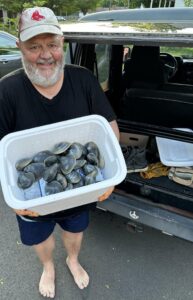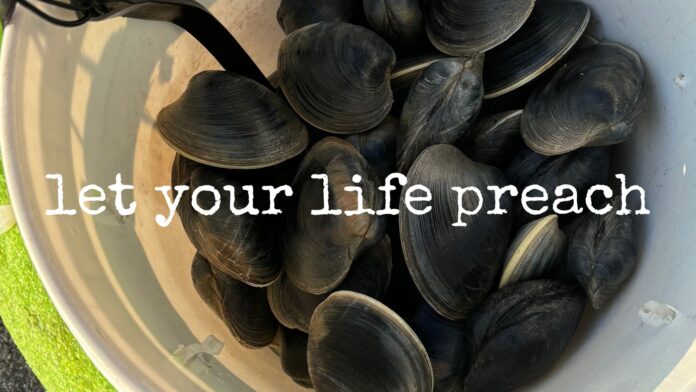If you were looking for a sermon that includes a Hebrew prophet, seraphs, clams, and homemade pizza, you just found it.
_________________________
 I did something on Friday I had never done before: I went clamming.
I did something on Friday I had never done before: I went clamming.
A man in the Guilford church named Charlie has talked to me about going for a while, but Friday around noon I got a text that was more specific inviting me to join him at low tide late that afternoon. I had to move quickly to get a license at the town hall and gather a few items he told me to bring, and then I drove out to the end of Trolley Road to begin my adventure.
A brief summary of what I did includes walking through soft mud where I almost got stuck, negotiating some rocky ground as well, raking and raking and raking, and finding a bunch of clams.
One of the big reasons I went, along with the fact that I love clams and I love doing new things, was that Charlie loves clamming and talks about it all the time. (And let me apologize in advance for this next statement.) He is a Clamvangelist. I wanted to go because he loves it so much.
Last night we had clams for dinner. When I say we, I mean Todd and I ate clams. Ginger and Rachel aren’t clam eaters. I made a clam pizza as well as stuffed clams. We ate well. (I also made a hamburger and black olive pizza for Ginger.) In the conversation after dinner, I said I needed to get back to my sermon, but before I did, I wondered how they would preach on this passage. I mean, I had two other clergy at the table; why miss the chance to get the extra input?
We talked our way through the story: Isaiah saw God sitting on a throne and the train of God’s robes filled up the whole Temple. I said I pictured an actress or model at one of those events where everyone dresses in designer gowns and one has a train that goes all the way down the steps. God was surrounded by serpahs—some sort of multi-winged angel that was on fire. That’s what the word seraph means: burning thing. And they had six wings. And they shouted so loudly they shook the place.
And the whole scene appeared to be set in motion by the death of King Uzziah. “In the year of King Uzziah’s death, I saw God . . .”
Perhaps Isaiah was simply making a calendar reference, but it feels like more—like Uzziah was important to the prophet and the death of the king threw his world into chaos. It’s a grief story.
Based on the vision, Isaiah was pretty shaken up—so much that in the face of the burning, six-winged whatevers that we shouting, he cried out as well: “I am a person with unclean lips and I live in the middle of people with unclean lips, yet I am still in the presence of God.”
As much as he was in awe of all he didn’t understand, he also found profound comfort in the middle of his grief. His king had died and now he stood in the presence of awesomeness he had never imagined—and he didn’t really know what to do with it, yet he felt surrounded by God.
Then one of the flaming angels took a live coal and touched Isaiah’s lips—the being touched the part Isaiah said was unclean—and told the prophet that he was forgiven. God followed up with a question that sounds as though it was being asked to a group, but there doesn’t seem to be anyone there but Isaiah and the seraphs.
“Whom should I send, and who will go for us?”
And I picture that Isaiah kind of looked around to see who else was there and then said, “I’m here; send me.”
God’s presence and comfort offered Isaiah a way through his grief.
As Ginger, Todd, and I bounced ideas back and forth at the dinner table, we talked about the way Isaiah saw himself as part of those to whom he spoke: “I am a person with unclean lips in the middle of a people with unclean lips.” When he said he was willing to be sent, he was speaking as a wounded healer, one who knew how hard life was.
We then noticed Isaiah preached that same sermon his whole ministry. He talked over and over about the ways in which God forgive, heals, and calls us through our grief. Skip down thirty-four chapters and Isaiah says,
Why do you declare, “My way is hidden, my God ignores my predicament”?
Don’t you know? Haven’t you heard? God is the everlasting God, the creator of the ends of the earth. God doesn’t grow tired or weary. God’s understanding is beyond human reach, giving power to the tired and reviving the exhausted.
Young people will become tired and weary, they will certainly stumble; but those who hope in the Lord will renew their strength; they will fly up on wings like eagles; they will run and not be tired; they will walk and not be weary.
God meets us in our grief with love and forgiveness was the sermon Isaiah preached his whole life—with his whole life. At the table, we wondered aloud what we were preaching with our words and actions.
Ginger said that when she was chaplain of the Student Government Association at her high school she led a spiritual practice time that focused on the words, “Love those who seem unlovable.” After watching her care for those around her, I can say she is still preaching that sermon.
Some time ago my most enduring friend Burt, whom I have known since college gave me a handwritten manuscript of a sermon I preached while we were roommates in seminary, many years before. The whole thing focused on how what mattered most was our connection to one another. God made us to love one another. That’s still the thing that matters most to me.
My life-long theme grows out of grief as well, but it is a grief it took me years to understand. As most of you know, my parents were missionaries when I was growing up and I lived in Africa until I was sixteen. It was an amazing way to grow up and I have many great memories.
But it was also a disconnected way to live. From kindergarten to twelfth grade, I went to ten different schools in five different cities and five different countries.
Burt met in the fall of 1976. In the fall of 1986, I called him to say he was the first friend whom I had known for ten years and known where they were for all ten years. That’s why I call him my most enduring friend.
Perhaps the theme of our lives—the sermon we preach with the way we live—is not so much something we choose as something that grows out of our experiences, out of our griefs and the way we look for God (or that God finds us) in the middle of it.
Which brings me to a question I want you to ponder: What is the sermon you are preaching with your life? Sermon may be too foreboding a word, so let me ask other ways: What is the theme of your life? The connecting thread? What is the story love tells through you? How has your grief opened your heart to see new mercies?
We are all saying something with our lives. May the words of our mouths, the meditations of our hearts, and the sermons of our lives be ones that point others to the enduring love of God. Amen.
Peace,
Milton

In my graduate conducting class we were discussing an anthem based on this text. My professor, Bev Henson, said something about cherubim and seraphim. I responded “six-winged seraphim.” And he laughed and said “they were cherubs, not dragon flies.” Needless to say I took a Bible to the next class to defend my honor.
Milton, in looking at the “sermon” of my life, I come back to Michael Card :
“Life is a song we must sing with our days
A poem with meaning more than words can say
A painting with colors no rainbow can tell
A lyric that rhymes either heaven or hell
We are living letters that doubt desecrates
We’re the notes of the song of the chorus of faith
God shapes every second of our little lives
And minds every minute as the universe waits by
The pain and the longing
The joy and the moments of light
Are the rhythm and rhyme
The free verse of the poem of life.”